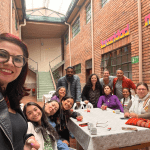By Dr Lorna Smith (Associate Professor in Education), Dr Jessie Abrahams (Lecturer in Education), Jo Carrington (Assistant Head of Literacy and English at Clevedon School) and PhD student, School of Education, University of Bristol.
We are in an era where top-down prescription in English secondary schools is greater than ever. This often results in students’ voices being diminished and opportunities to talk suppressed. For example, some schools virtue-signal their strict ‘no-hands up’ policy – meaning that students speak in class only when they are invited to. Therefore, although high-quality talk has long been established as a vital component of learning (Alexander, 2020; Bleiman, 2018; Littleton and Mercer, 2013), there may be few
opportunities for students to experience ‘natural’ conversation – listening and contributing according to the ebb of the discussion. (more…)

 erbaijan and I had the privilege of being an international Master’s student at the
erbaijan and I had the privilege of being an international Master’s student at the 
 By Chidinma Ibemere, MSc Education (Leadership and Policy),
By Chidinma Ibemere, MSc Education (Leadership and Policy),